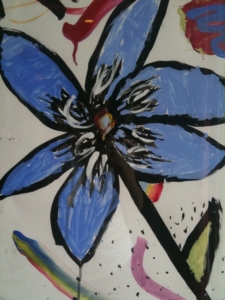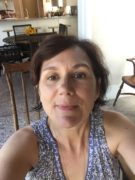Writing My Way Home
 In June, I was scheduled to go to my third ten day residency for an MFA program in creative writing and, unlike everyone else who was dying to immerse themselves in their passion and reconnect with their MFA friends, I felt ambivalent about my return. I worried that the program and my plan to be a writer wasn’t taking hold.
In June, I was scheduled to go to my third ten day residency for an MFA program in creative writing and, unlike everyone else who was dying to immerse themselves in their passion and reconnect with their MFA friends, I felt ambivalent about my return. I worried that the program and my plan to be a writer wasn’t taking hold.
I had always dreamed of being a writer and felt that it was “my time,” but I had been home for twenty years, at the center of family, raising two kids, being the tree around which my family swirled.
My family was not swirling so much anymore. And even as I tried to see the extra time as an opportunity, I felt a loss of identity and purpose. The residency was in Los Angeles where I lived, so I negotiated with myself—I would participate in the classes, workshops and readings during the long days and see my family most evenings. I steeled myself and went, trying to open myself to the experience of the workshops, classes and readings while battling anxiety about abandoning my family. Crazy and irrational, I know, since they supported me going. But that’s how I felt.
* * *
How did I get so enmeshed in my family? Let me roll back the tape eighteen years. My husband and I are sitting in a black box of an office being told the results of a report by a developmental pediatrician who examined our one-and-a-half year old son.
“Your son has developmental delays,” she said.
That news broke over us like a tidal wave, hitting my husband Jason first. I refused to believe her, and decided to take the report to our regular pediatrician, Dr. K, for a second opinion.
On the ride home, I could see my optimistic, loving, wise husband for the first time in our relationship unable to speak. He wiped at tears as he drove, trying to hold back all the pain and fear he was feeling.
“Let’s talk to Dr. K. I’m not convinced,” I said. “He would’ve said something if he thought Hunter had developmental delays.”
Jason kept driving, mute, trying hard to keep it together. It scared me. I wanted to shake him.
I met with Dr. K the next morning. “I read the report,” he said. “I’m so sorry.”
“But you never said you thought Hunter had developmental delays.”
“I’ve read the report, and I agree with her,” Dr. K said.
And just like that I was in the crashing waves, worrying about our son’s future. Would he speak or make friends? Would he look us in the eyes or go to college? Would he relate to us or to anyone? Would he live independently? Would he get married?
I was sick with a cold that blossomed into a flu on the way home. I asked the babysitter to stay. When I got home, I saw Hunter with his pudgy fingers and soft cheeks. He inserted a key in a lock, turned it and pulled it out with great concentration again and again, an activity he could do for hours. Past experience told me if I tried to take him to the park or disrupt this play in any way, he would try to bite me. The developmental pediatrician told us this was not the exploratory play that children need to do to understand the world. Hunter’s play was his way of quelling anxiety. I had known something was wrong; it was only now that I could let myself know.
I stayed in bed over the weekend, feverish and despondent, until the day turned to night. I heard Jason come and go, Hunter wake up and the noises of life moving along, but I couldn’t face the day.
I had a book on my night stand called Let Me Hear Your Voice, by Catherine Maurice. When I woke in the cocoon of the night, I read. In this book, the son didn’t connect, lost his words, played repetitively and became angry during transitions. The boy in the book had a different diagnosis—autism.
Maurice found her son a speech therapist, a behaviorist, a play therapist, enrolled him in school and learned how to engage him. This non-verbal, socially isolated, inflexible two-year-old boy, with massive intervention, got better. At seven, he conversed, connected, and interacted with the world.
 A light went on inside me—Catherine Maurice’s son got better. Even though it was four in the morning, I was wide awake. I went down to the dark kitchen and left a question for the developmental pediatrician on her voicemail.
A light went on inside me—Catherine Maurice’s son got better. Even though it was four in the morning, I was wide awake. I went down to the dark kitchen and left a question for the developmental pediatrician on her voicemail.
“Why aren’t you saying that Hunter has autism?” I said. Uttering the “a” word scared me.
She called me that morning.
“I would say Hunter has autism except for the connection that I saw between you and him,” she said. “Autism or developmental delay—the treatment is the same.” Hunter would later be diagnosed with autism.
“What do I do?” I asked.
“He needs play therapy, speech therapy, a school program, occupational therapy, and for you to interact with him,” she said. “You have the most hope of effecting his potential during this time.”
The sun came through the window beaming squares of light onto our yellow kitchen wall.
I asked, “If he is developmentally delayed, can he catch up?”
She said, “It is not if. He is developmentally delayed. You can significantly effect the trajectory of his life.”
And like that, after two days in bed, I was back. Catherine Maurice’s story had given me hope and now I knew my purpose. I would catch Hunter up. I would merge with him. I would give everything and leave nothing on the table. I would learn how to engage him, get him the right speech therapists, find the schools, mediate his playdates. I would negotiate, advocate, and interpret the world for Hunter so he could understand and interact.
After all, the thing that crushed me was thinking about Hunter alone in the world. The words, “developmental delay” sat like a weight on my throat. I pictured a herd of gazelles running and one delayed gazelle falling behind. I’d be the bridge, a friend, a guide, and help him find his words. I made a vow to myself—I would never leave him behind.
* * *
Every stage brought rewards and challenges. From being non-verbal at three, after intervention, Hunter said to a friend who took a toy train—something that would have elicited biting in the past–“I think we have a problem here.” He negotiated for his train back. He stopped biting. He sang in the choir, played chess, baseball, and tennis. He made a friend.
We had our daughter when Hunter was four and built a bridge between the two of them.
He loved board games so we played poker, Monopoly, chess, Settlers of Catan, Ticket to Ride. While we played, we talked about baseball, hockey, politics, music, life.
* * *
Hunter is twenty now and, with the help of a transition program, will attend college in the fall in Vermont.
Socializing, like navigating a foreign city without a guide, is still hard for Hunter. So he takes breaks. He tells me he doesn’t want me to micromanage him, doesn’t want me merged with him anymore.
A family therapist told me it’s time to let myself dive into my life and to let Hunter make his way more independently in the world.
Our daughter is sixteen and independent—a confident young woman. My husband’s work will bring him to New York in the fall. It’s getting kind of lonely and boring to be the tree around which no one is swirling.
* * *
So I return to the MFA program in June at Antioch, and I try to give myself permission to let myself dive in.
But the first few days I am sort of here, but I am there, at home, too. Is everyone okay? Is Hunter getting out in the day? Is he connecting with his dad?
Then I go to lunch with three women from class. We talk about books, family, and our projects over pulled pork sandwiches. I feel comfortable, happy, and privileged to be at the table with these intelligent women all doing something as ambitious, lofty, and romantic as writing a book.
I go home and my family is still there. I tell my husband that I’ve been anxious. I have one foot in my world at home and one tentative toe in this new world. I’m starving to find a way to contribute in the larger world, to find my voice, to be seen, and to have a bigger context than my family and friends. He tells me what I need to hear:
“You’re not going to lose us,” he says.
 The next day I go to a reading of graduating students. I am awash in the stories of all the students who I have not come to know. One student reads a wrenching short story about growing up with a bipolar mother. One reads a historical fiction account of a man who founded the national parks system in England. Another story is told in spare prose about a woman in college who is raped and another is about a girl who sees the world through the lens of the dissected frog from science class. I allow myself to lose myself in each of the stories and savor the feast of voices, textures, and paths of my fellow students.
The next day I go to a reading of graduating students. I am awash in the stories of all the students who I have not come to know. One student reads a wrenching short story about growing up with a bipolar mother. One reads a historical fiction account of a man who founded the national parks system in England. Another story is told in spare prose about a woman in college who is raped and another is about a girl who sees the world through the lens of the dissected frog from science class. I allow myself to lose myself in each of the stories and savor the feast of voices, textures, and paths of my fellow students.
These students don’t look like strangers anymore. I let myself stand in the river of their stories, let them surround me, let them engulf me and carry me away for a while. I realize I’ve hardly thought about my family all day long.
In the elevator on the way to my car, I meet the writer who read his story about the bipolar mother. Before he was just a guy, but after hearing his story, I see him.
“I loved your story. It was so courageous. I’m so glad I got to hear it.”
I arrive home for dinner with my kids, and I hike with my husband before class the next morning. Days later I am the one reading a story, adding my words to the tapestry of voices at the residency.
* * *
Maybe I can follow my passion and still have my family too?
Days after the residency was over, I had to write this blog. I was feeling anxious and unsettled.
Mondays are especially hard, as everyone in my family has a place to go. My husband goes to his office and my kids to their activities. To be a writer, I have to build where I am going, and every day I wonder if I will be able to deliver myself there. Writing is like rubbing sticks together and hoping I can spark a flame, a campfire that will keep me warm, that will light up my world.
I exercised. I wanted to call someone. My mother? My sister? I longed for that feeling of home and family and purpose.
Instead, I did a simple thing. I went to Starbucks and wrote down what I was thinking. Though I physically sat in Starbucks, soon I was in my imagination. I had only a vague sense of the people around me or which song played. The skittish feeling dissolved. In its place, I found myself in flow on the river of words and ideas, crafting sentences, reflecting and discovering and, amazingly, beginning to make sense of the mystery that is me. I don’t need to call anyone or go anywhere. I am complete, whole, home.
It is “my time,” I decide. I intend to take it.
 Kathleen Katims is a candidate for an MFA in Creative Writing at Antioch University. She writes fiction and creative nonfiction. Her work has been published in Verdad Magazine and The Penman Review. She is working on a book called Second Acts, interviewing, researching, and writing about people who had interesting journeys out of being stuck and moved in the direction of their dreams. She lives in Los Angeles, California with her awesome husband, two cool cat kids, and big brown dog.
Kathleen Katims is a candidate for an MFA in Creative Writing at Antioch University. She writes fiction and creative nonfiction. Her work has been published in Verdad Magazine and The Penman Review. She is working on a book called Second Acts, interviewing, researching, and writing about people who had interesting journeys out of being stuck and moved in the direction of their dreams. She lives in Los Angeles, California with her awesome husband, two cool cat kids, and big brown dog.





